|
|
Venerable Macarius The Great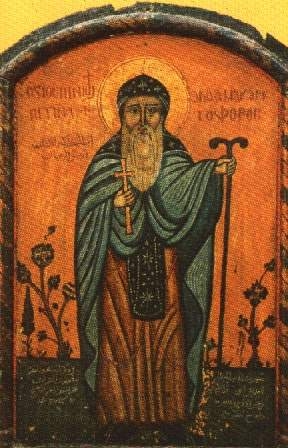 Macarius was an Egyptian and one of the younger contemporaries of Anthony the Great. His father was a priest. Out of obedience to his parents, Macarius married. However, his wife died shortly thereafter and he withdrew into the wilderness where he spent sixty years in labor and struggle, both internally and externally for the Kingdom of Heaven. When they asked him: "Why is he so thin when he eats and when he does not eat?" He responded: "From the fear of God." So much did he succeed in cleansing his mind of evil thoughts and his heart of evil desires that God bestowed upon him the abundant gift of miracle-working so that he even raised the dead from the graves. His humility amazed both men and demons. A demon once said to him: "There is only one thing in which I am unable to overpower you. It is not in fasting; for I do not eat anything. It is not in vigils; for I never sleep." "But, what is it?" asked Macarius. "Your humility" answered the demon. Macarius often spoke to Paphnutius, his disciple: "Do not judge anyone and you will be saved." Macarius lived to be ninety-seven years old. Nine days before his death, St. Anthony and St. Pachomius appeared to him from the other world and informed him that he would die within nine days, which happened. Also, before his death, Macarius had a vision in which a cherubim revealed to him the blessed heavenly world, commended his effort and his virtue and said to him that he was sent to take his soul into the Kingdom of Heaven. He died in the year 390 A.D. Macarius was an Egyptian and one of the younger contemporaries of Anthony the Great. His father was a priest. Out of obedience to his parents, Macarius married. However, his wife died shortly thereafter and he withdrew into the wilderness where he spent sixty years in labor and struggle, both internally and externally for the Kingdom of Heaven. When they asked him: "Why is he so thin when he eats and when he does not eat?" He responded: "From the fear of God." So much did he succeed in cleansing his mind of evil thoughts and his heart of evil desires that God bestowed upon him the abundant gift of miracle-working so that he even raised the dead from the graves. His humility amazed both men and demons. A demon once said to him: "There is only one thing in which I am unable to overpower you. It is not in fasting; for I do not eat anything. It is not in vigils; for I never sleep." "But, what is it?" asked Macarius. "Your humility" answered the demon. Macarius often spoke to Paphnutius, his disciple: "Do not judge anyone and you will be saved." Macarius lived to be ninety-seven years old. Nine days before his death, St. Anthony and St. Pachomius appeared to him from the other world and informed him that he would die within nine days, which happened. Also, before his death, Macarius had a vision in which a cherubim revealed to him the blessed heavenly world, commended his effort and his virtue and said to him that he was sent to take his soul into the Kingdom of Heaven. He died in the year 390 A.D. Venerable Marcarius Of Alexandria Macarius was born in Alexandria and, at first, was a fruit vendor. He was baptized at age forty and as soon as he was baptized, he immediately withdrew to lead a life of asceticism. At first, he, together with Macarius the Great, was a disciple of St. Anthony. After that, he became the abbot of the Monastery called the Cells, located between Nitria and Skete. He was somewhat younger than Macarius the Great and also lived longer. He lived to be more than a hundred years old. Tormented by demonic temptations, especially the temptation of vanity, he humbled himself by the most rigorous labors and ceaseless prayer, uplifting his mind constantly toward God. Once, a brother saw him fill a basket with sand, carry it uphill and empty it. Astonished, the brother asked him, "What are you doing?" Macarius answered, "I am tormenting my tormentor," i.e. the devil. He died in the year 393 A.D. Macarius was born in Alexandria and, at first, was a fruit vendor. He was baptized at age forty and as soon as he was baptized, he immediately withdrew to lead a life of asceticism. At first, he, together with Macarius the Great, was a disciple of St. Anthony. After that, he became the abbot of the Monastery called the Cells, located between Nitria and Skete. He was somewhat younger than Macarius the Great and also lived longer. He lived to be more than a hundred years old. Tormented by demonic temptations, especially the temptation of vanity, he humbled himself by the most rigorous labors and ceaseless prayer, uplifting his mind constantly toward God. Once, a brother saw him fill a basket with sand, carry it uphill and empty it. Astonished, the brother asked him, "What are you doing?" Macarius answered, "I am tormenting my tormentor," i.e. the devil. He died in the year 393 A.D. Saint Arsenius, Bishop Of Corfu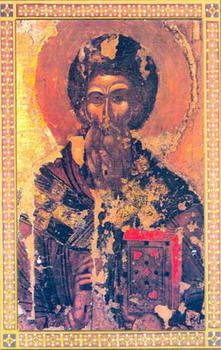 Arsenius augmented and structured the Rite of the Sacrament of Holy Unction [Anointing with Oil] to its present form. He died in the year 959 A.D. His relics repose in the cathedral church in Corfu. Arsenius augmented and structured the Rite of the Sacrament of Holy Unction [Anointing with Oil] to its present form. He died in the year 959 A.D. His relics repose in the cathedral church in Corfu.Saint Mark, Archbishop Of Ephesus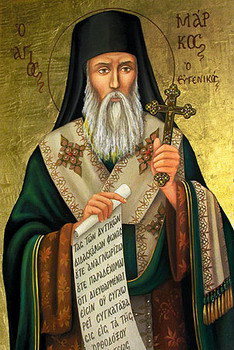 Mark was famous for his courageous defense of Orthodoxy at the Council of Florence (1439 A.D.) in spite of the emperor and the pope. He died peacefully in the year 1452 A.D. On his death bed, Mark implored Gregory, his disciple, and later the glorious Patriarch Genadius, to be careful of the snares of the West and to defend Orthodoxy. Mark was famous for his courageous defense of Orthodoxy at the Council of Florence (1439 A.D.) in spite of the emperor and the pope. He died peacefully in the year 1452 A.D. On his death bed, Mark implored Gregory, his disciple, and later the glorious Patriarch Genadius, to be careful of the snares of the West and to defend Orthodoxy.Blessed Theodore, "Fool For Christ" From Novgorod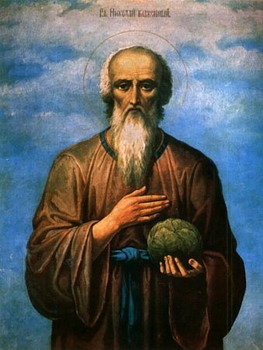 Prior to his death, Theodore ran up and down the streets shouting to everyone: "Farewell, I am traveling far away!" He died in the year 1392 A.D. Prior to his death, Theodore ran up and down the streets shouting to everyone: "Farewell, I am traveling far away!" He died in the year 1392 A.D.Virginmartyr Euphrasia of Nicomedia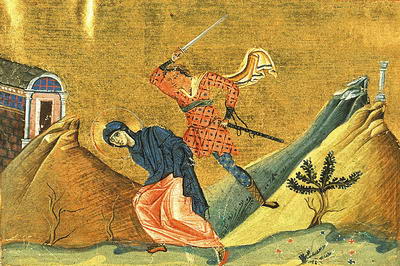 The Holy Virgin Martyr Euphrasia was born at Nicomedia into an illustrious family. She was a Christian, and was noted for her beauty. During the persecution of Christians by Maximian, the pagans tried to compel Euphrasia to offer sacrifice to idols. When she refused, she was beaten, and then given to a certain barbarian to be violated.
The saint prayed tearfully to the Lord that He would preserve her virginity, and God heard her prayer. St Euphrasia suggested to the barbarian that if he would not defile her, she would give him a special herb which would protect him from enemy weapons and death. But this herb, she explained, held its power only when received from a virgin and not from a woman.
The soldier believed St Euphrasia and went with her into the garden. The holy virgin picked the herb, then offered to demonstrate its power. She placed the herb on her neck and told the man to strike her with his sword. With a mighty blow, he cut off her head. Thus her prayer was answered, and the wise virgin offered her soul to God in 303, safeguarding her bodily purity. The Holy Virgin Martyr Euphrasia was born at Nicomedia into an illustrious family. She was a Christian, and was noted for her beauty. During the persecution of Christians by Maximian, the pagans tried to compel Euphrasia to offer sacrifice to idols. When she refused, she was beaten, and then given to a certain barbarian to be violated.
The saint prayed tearfully to the Lord that He would preserve her virginity, and God heard her prayer. St Euphrasia suggested to the barbarian that if he would not defile her, she would give him a special herb which would protect him from enemy weapons and death. But this herb, she explained, held its power only when received from a virgin and not from a woman.
The soldier believed St Euphrasia and went with her into the garden. The holy virgin picked the herb, then offered to demonstrate its power. She placed the herb on her neck and told the man to strike her with his sword. With a mighty blow, he cut off her head. Thus her prayer was answered, and the wise virgin offered her soul to God in 303, safeguarding her bodily purity. Venerable Meletius the Gallesiote Confessor of Mount Galesion (north of Ephesus), monk (1283)
St Anthony the Founder of Monasticism in Georgia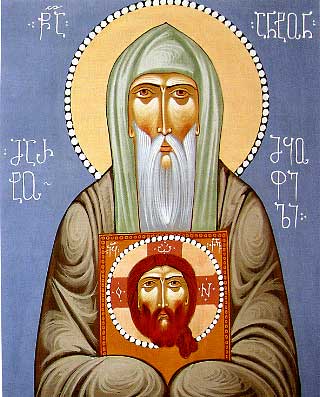 Our holy father Anton of Martqopi arrived in Georgia in the 6th century with the rest of the Thirteen Syrian Fathers and settled in Kakheti to preach the Gospel of Christ. He always carried with him an icon of the Savior “Not-Made-By-Hands.” Anton made his home in the wilderness, and deer visited him every evening to nourish him with their milk.
One day the deer arrived earlier than expected, and they were followed by a wounded fawn. Clearly something had frightened them.
When Anton retraced the animals’ path, he discovered a nobleman, the head of a nearby village, hunting in the fields. Astonished to see the old monk with his icon, standing amidst a gathering of deer, the nobleman, being a pagan, became convinced that he was dangerous and ordered his servants to take him to a smith and chop off his hands.
Anton was led at once to the smith, but when the craftsman heated his sword and drew it above the monk’s hands in preparation, he fell down suddenly and his arms became like wood.
The daunted smith fell mute, but blessed Anton made the sign of the Cross over him and he was immediately healed.
Having heard about this miracle, the nobleman perceived that Abba Anton was truly holy, and he began to hold him in reverence. “Tell me what you need, and I will provide it for you,” he told Elder Anton. The monk requested a single piece of salt, and they brought him two large blocks. He broke off a small piece and placed it near his cell for the deer.
After the incident at the smith’s, many people began to visit Anton, and the holy father constructed a monastery for the faithful.
But before long their attention became burdensome, and Elder Anton fled from the world to the peak of a mountain. There he began to preach from the top of a pillar, where he would remain the last fifteen years of his life.
When God revealed to Fr. Anton the day of his repose, the monk-stylite gathered his pupils, imparted to them a few last words of wisdom, blessed them, and died on his knees in front of his beloved icon.
St. Anton’s body was taken down from the pillar and buried in the monastery that he had founded, before the icon of the Theotokos. Our holy father Anton of Martqopi arrived in Georgia in the 6th century with the rest of the Thirteen Syrian Fathers and settled in Kakheti to preach the Gospel of Christ. He always carried with him an icon of the Savior “Not-Made-By-Hands.” Anton made his home in the wilderness, and deer visited him every evening to nourish him with their milk.
One day the deer arrived earlier than expected, and they were followed by a wounded fawn. Clearly something had frightened them.
When Anton retraced the animals’ path, he discovered a nobleman, the head of a nearby village, hunting in the fields. Astonished to see the old monk with his icon, standing amidst a gathering of deer, the nobleman, being a pagan, became convinced that he was dangerous and ordered his servants to take him to a smith and chop off his hands.
Anton was led at once to the smith, but when the craftsman heated his sword and drew it above the monk’s hands in preparation, he fell down suddenly and his arms became like wood.
The daunted smith fell mute, but blessed Anton made the sign of the Cross over him and he was immediately healed.
Having heard about this miracle, the nobleman perceived that Abba Anton was truly holy, and he began to hold him in reverence. “Tell me what you need, and I will provide it for you,” he told Elder Anton. The monk requested a single piece of salt, and they brought him two large blocks. He broke off a small piece and placed it near his cell for the deer.
After the incident at the smith’s, many people began to visit Anton, and the holy father constructed a monastery for the faithful.
But before long their attention became burdensome, and Elder Anton fled from the world to the peak of a mountain. There he began to preach from the top of a pillar, where he would remain the last fifteen years of his life.
When God revealed to Fr. Anton the day of his repose, the monk-stylite gathered his pupils, imparted to them a few last words of wisdom, blessed them, and died on his knees in front of his beloved icon.
St. Anton’s body was taken down from the pillar and buried in the monastery that he had founded, before the icon of the Theotokos. Venerable Macarius of the Kiev Caves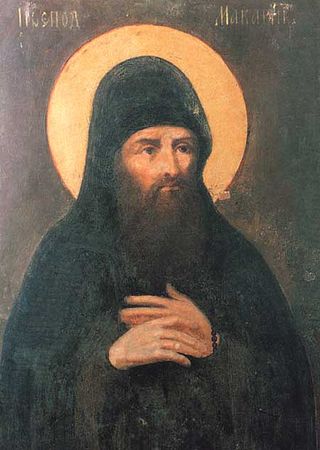 The Monk Makarii, Faster of Pechersk, in the Nearer Caves (XII), and the Monk Makarii, Deacon of Pechersk, in the Farther Caves (XIII-XIV), were both deacons. Their memory is placed under 19 January because of their name in common with the Monk Makarios of Egypt. About the Monk Makarii from the Farther Caves is known, that he was distinguished by his lack of covetousness, that he possessed great fervour for the temple of God and he continuously exerted himself in the reading of Holy Scripture and in fasting. According to tradition, he was frequently ill in childhood, and his parents gave a vow to God to offer their son to the Pechersk monastery, if he were made healthy. By his mildness and humility he earned the love of the brethren, who taught him to read and to write. For his piety of life he was raised to the dignity of deacon, and during his life he possessed a gift of wonderworking. Apart from this commemoration, the Monk Makarii from the Nearer Caves is also celebrated on 28 September, and the Monk Makarii from the Farther Caves on 28 August. The general commemoration is with all the Pechersk wonderworkers – on the 2nd Sunday of Great Lent. The Monk Makarii, Faster of Pechersk, in the Nearer Caves (XII), and the Monk Makarii, Deacon of Pechersk, in the Farther Caves (XIII-XIV), were both deacons. Their memory is placed under 19 January because of their name in common with the Monk Makarios of Egypt. About the Monk Makarii from the Farther Caves is known, that he was distinguished by his lack of covetousness, that he possessed great fervour for the temple of God and he continuously exerted himself in the reading of Holy Scripture and in fasting. According to tradition, he was frequently ill in childhood, and his parents gave a vow to God to offer their son to the Pechersk monastery, if he were made healthy. By his mildness and humility he earned the love of the brethren, who taught him to read and to write. For his piety of life he was raised to the dignity of deacon, and during his life he possessed a gift of wonderworking. Apart from this commemoration, the Monk Makarii from the Nearer Caves is also celebrated on 28 September, and the Monk Makarii from the Farther Caves on 28 August. The general commemoration is with all the Pechersk wonderworkers – on the 2nd Sunday of Great Lent.Venerable Cosmas, of the Monastery of St. John Chrysostom, at Koutsovendis, Cyprus
|